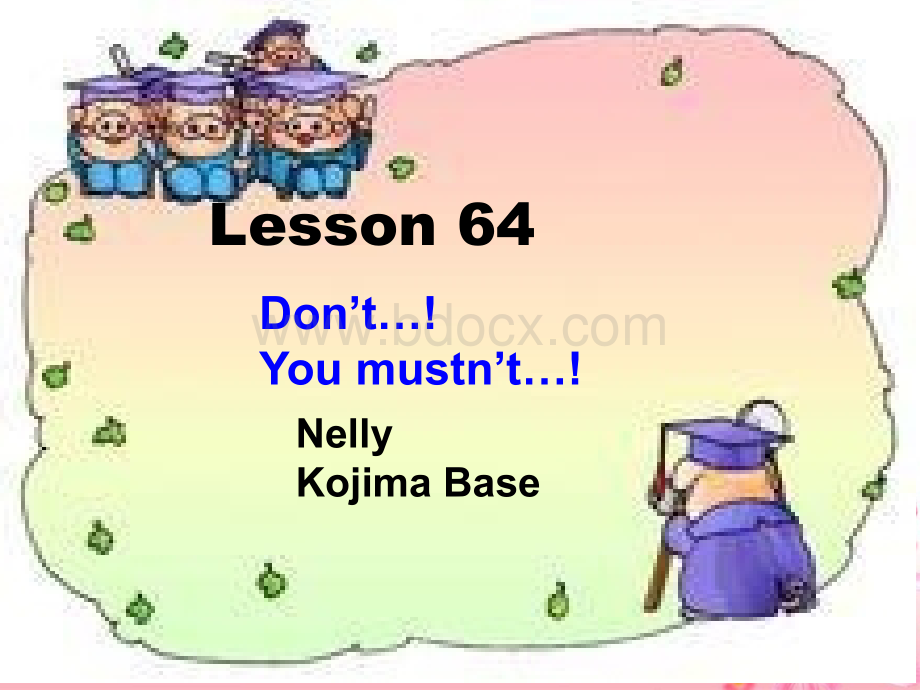新概念英语第一册Lesson63-64精品课件!.ppt
《新概念英语第一册Lesson63-64精品课件!.ppt》由会员分享,可在线阅读,更多相关《新概念英语第一册Lesson63-64精品课件!.ppt(30页珍藏版)》请在冰豆网上搜索。

Lesson64Dont!
Youmustnt!
NellyKojimaBaseWhatsthematterwiththetiger?
No,hedoesnthaveaheadache.Doesithaveaheadache?
Itmustseethedentist.Ithasatoothache.Whatmustitdo?
WhatsthematterwithJoline/her?
Doesshehaveabackache?
No,shedoesnthaveabackache.Shehasastomachache.Whatmustshedo?
Shemusttakesomemedicine.Review!
1.Whatsthematterwithsb.:
sb.要用人称的要用人称的。
Whatsthematterwithme/you/him/her/it/us/them.2.have:
可以和表示疾病的名词连用,表示得了某种可以和表示疾病的名词连用,表示得了某种疾病。
注意:
表达某人有某物,只能用疾病。
注意:
表达某人有某物,只能用:
例如:
她感冒了例如:
她感冒了。
询问某人或某事物的状况询问某人或某事物的状况have:
还可以表示拥有:
他有很多书。
还可以表示拥有:
他有很多书。
Shehasacold.Hehasalotofbooks.2.Must:
是情态动词,没有人称时态的变化,其后直接加动词的:
是情态动词,没有人称时态的变化,其后直接加动词的原型原型如:
他必须回家:
如:
他必须回家:
Hemustgohome.宾格形式宾格形式对比:
对比:
Hegoeshomeeveryday.have的第三人称单数形式是:
的第三人称单数形式是:
hasWords&expressions1playwithsb./sth.,玩玩(东西)(东西)/和某人一起玩。
和某人一起玩。
Thechildrenareplayingwithatoycarinthegarden.孩子们正在花园玩一辆玩具汽车。
孩子们正在花园玩一辆玩具汽车。
2.match,火柴火柴Playwithmatches,玩火柴。
玩火柴。
3.talk:
v.谈话,与某人谈话:
谈话,与某人谈话:
talkwithsb.talkaboutsth.讨论某事讨论某事4.library:
图书馆:
图书馆5.drive:
开车去某处:
开车去某处:
drivetosomeplace也可作名词:
也可作名词:
Canyougivemeadrive?
能载我一程吗能载我一程吗?
6.so:
adv.如此地:
常常修饰形容词或副词SheissobeautifulthatIfallinlovewithher.Dontspeaksofast/quickly,Icantfollowyou.7.quickly:
副词,形容词quick,Itrainedsoheavilythatwerantotheroomquickly.8.leanoutof:
身体探出lean:
斜靠:
leanagainsthewall:
靠着墙9.break:
动词打破,名词,休息:
Letshaveabreak.=Letshavearest.10.noise:
名词,噪音,喧闹声,形容词noisy:
ItissonoisythanIcantfallasleep.talkLibrarydrivesoquicklybreakaspirinmedicinenoisev.谈话谈话n.图书馆图书馆v.开车开车adv.如此地如此地somuchadv.快地快地v.打破打破n.阿司匹林阿司匹林n.药药n.喧闹声喧闹声WordsreviewStopthem!
Dontfightwitheachother!
Youmustntfightwitheachother!
Inthelibrary:
Stopthem!
Donttalkinthelibrary!
Youmustnttalkinthelibrary!
Notalking!
Dontdrivesoquickly!
Youmustntdrivesoquickly!
Dontplaywithmatches!
Youmustntplaywithmatches!
Dontleanoutofthewindow!
Youmustntleanoutofthewindow!
Dontbelateforclass!
Youmustntbelateforclass!
Groupwork!
Classrules!
Whatmustntyoudo?
Youarethemonitorinyourclass,helptheteachertomakeclassrules!
Dont.Youmustnt.OpenyourbookandfinishPartB!
Letslistentothetapeandrepeat!
FinishPartAonpage128.Summary:
Whatarethedifferences?
共同点共同点:
都可以用来表示禁令:
表示:
禁止的意:
都可以用来表示禁令:
表示:
禁止的意思,后面都跟动词的思,后面都跟动词的原形原形。
不同处不同处:
dont直接用于句首,够成祈使句的否定句式。
直接用于句首,够成祈使句的否定句式。
Mustnt:
表示禁止是情态动词,必须位于主语之表示禁止是情态动词,必须位于主语之后。
后。
表示禁止或不许可时表示禁止或不许可时:
_比比_的的语气更强烈。
语气更强烈。
mustntdontLesson63Thankyou,doctor.bettercertainlygetupyetrichfoodremaincomeupstairseachdayadj.well的比较级的比较级adv.当然当然起床起床adv.还,还,仍仍adj.油腻的,富裕的油腻的,富裕的n.食物食物v.保持,保持,继续继续上楼上楼,下楼:
下楼:
godownstairs每一天每一天WordsstudyDoyouwanttobeadoctor?
Why?
Whynot?
How,beJimmy?
He,better,Comeupstairs,seehimYou,lookverywell,You,mustnot,getupyou,must,stayinbed,anothertwodays.Theboymustnt,eatrichfoodorgotoschool,He,must,stayinbed,fortwodaysYou,keeptheroomwarm,Where,beMr.Williams,He,beinbedandhaveabadcoldCanyou,see,he?
Letslistentothetapeandanswer!
Whoelseisinbedtoday?
Why?
Mr.Williamsisinbed.Becausehehasabadcold.1.1.DoesJimmylookwelltoday?
2.Yes,hedoes.3.2.CanJimmygetupnow?
4.No,hecant.5.3.WhatmustntJimmydo?
6.Hemustntgetupyet.7.4.HowlongmustJimmystayinbed?
8.Hemuststayinbedforanothertwodays.Listentothetapethenanswerthesequestions.5.CanJimmygotoschoolnow?
No,hecant.6.DoesJimmyhaveatemperature?
No,hedoesnt.7.WhatmustntJimmyeat?
Hemustnteatrichfood.8.WhatmustMrs.Williamdo?
Shemustkeeptheroomwarm.Listentothetapethenanswerthesequestions.课文详解!
1.Howmuchfruitdoyoueateveryday?
2.Abluewhaleeatsfourtonsoffoodeachday.everyday和eachday的区别:
第一句强调的是“频度”,旨在说明“每天”做的事情;第二句强调的是“平均每天”,大家可以想到鲸鱼不可能每天都能捕获4顿食物,所以只能取平均的数值。
keepsth.+形容词:
保持形容词:
保持.=remain+adj。
Shekeepsyoungattheageoffifty.Sheremainsyoungattheageoffifty.fortwohours.:
for可译为:
达,每天可起来多达两个可译为:
达,每天可起来多达两个小时。
小时。
each可作代词和形容词,而可作代词和形容词,而every只能用作形容词,如可只能用作形容词,如可以说以说eachofthesedictionaries或或eachoneofthesedictionaries,但不能说但不能说everyofthesedictionaries,该用该用everyoneofthesedictionaries。
2.each可指两个或两个以上中间的每一个,而可指两个或两个以上中间的每一个,而every只可只可指三个或三个以上中间的每一个,不能指两个中每一个。
指三个或三个以上中间的每一个,不能指两个中每一个。
如:
如:
可以说可以说eachofmyeyes,不可说不可说everyoneofmyeye但可说但可说everyoneofmytoes(脚趾脚趾)。
Retellthestory!
ThedoctorcomestoMr.WilliamshousetovisitJimmy.Heis_now,buthe__upyet,becuasehemust___foranother_days.Hecanteat__.ThedoctortellsMrs.WilliamsthatJimmycan__forabout_houseachday,soshemust_theroom_.Unfortunately,Mr.Williamsin__.Becuasehe_abad_.bettermustnttworichfoodgetuptwokeepwarminbedhascoldgetstayinbedHomework1.Writedownyourfamilyrules.2.Previewnexttwolessons3.FinishtheexercisesontheEB.